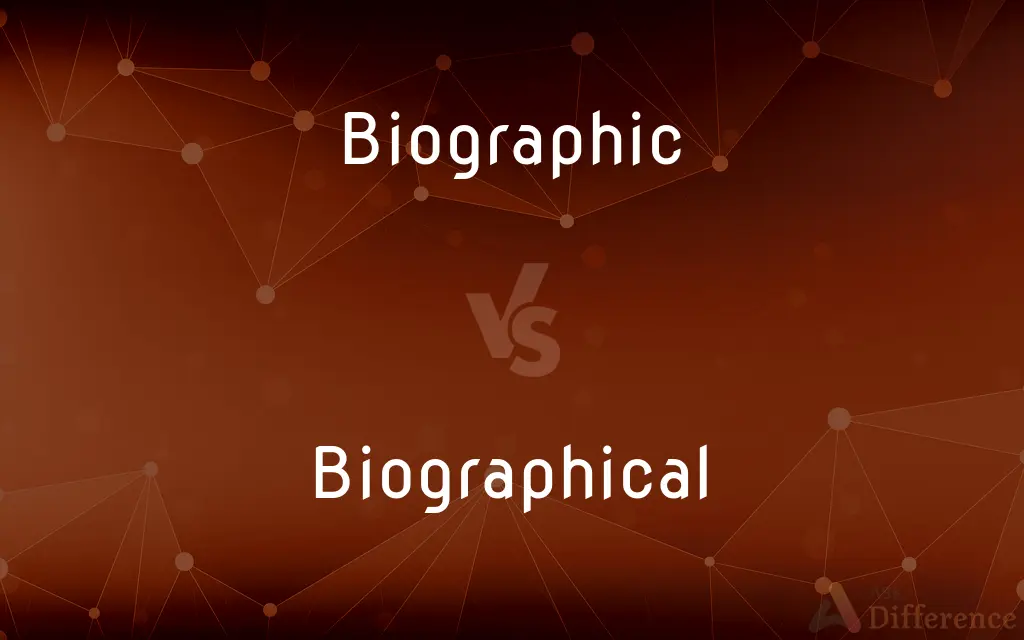Biographic vs. Biographical — What's the Difference?
By Urooj Arif & Fiza Rafique — Updated on March 27, 2024
Biographic refers to the basic facts or elements of a person's life story, while biographical pertains to the detailed description or account of someone's life.

Difference Between Biographic and Biographical
Table of Contents
ADVERTISEMENT
Key Differences
Biographic information typically includes fundamental details such as dates of birth and death, education, career highlights, and major accomplishments. This form is concise and factual, often used in contexts where a brief overview is required. On the other hand, biographical content goes beyond mere facts, providing a comprehensive narrative that explores a person's experiences, influences, relationships, and the impact they have had on their field or society. This distinction underscores the difference between a summary of life events and an in-depth exploration.
The term "biographic" suggests a focus on specific, often quantitative, aspects of a person's life, such as milestones and factual data. It is suited for quick reference or identification purposes, like a curriculum vitae. Biographical, however, implies a qualitative analysis, incorporating storytelling elements to paint a full picture of a person's life and character. It's more commonly found in books, documentaries, and lengthy articles that aim to understand the person's life contextually.
In academic and research settings, biographic data is used to support studies or analyses that require basic personal information as part of a larger dataset. This can include demographic studies or statistical research. Biographical works, however, are used in historical research, literature, and education to provide deeper insights into individuals' lives, often to understand historical periods or societal changes through personal narratives.
Biographic details are essential for establishing a factual foundation about a person, often serving as the basis for further exploration or research. Without biographic information, the richer, more detailed narratives found in biographical accounts would lack the necessary framework of facts and dates that anchor the story in reality.
While both biographic and biographical information serve to inform about a person's life, their use and presentation cater to different needs and contexts. Biographic information is succinct and to the point, perfect for quick facts or summaries. In contrast, biographical information delves into the nuances of a person's life, offering a comprehensive and nuanced view that can evoke empathy, understanding, and a deep sense of connection to the individual being studied.
ADVERTISEMENT
Comparison Chart
Definition
Pertaining to the basic facts of a person's life.
Pertaining to a detailed description or account of someone's life.
Content Type
Concise, factual details.
Comprehensive narratives and analyses.
Usage
Quick reference, identification, and summaries.
In-depth exploration, storytelling, and historical context.
Focus
Specific, often quantitative aspects (dates, achievements).
Qualitative analysis, life's impact, and personal experiences.
Common Formats
CVs, databases, short profiles.
Books, documentaries, lengthy articles.
Compare with Definitions
Biographic
Focused on milestones and achievements.
Her biographic profile highlighted her Nobel Prize win.
Biographical
Pertaining to the narrative study of historical figures.
The library's biographical section contains books on various leaders.
Biographic
Constituting a brief overview of life events.
The conference program included a biographic sketch of each speaker.
Biographical
Concerning a comprehensive account of a person’s life.
The biographical film explored the artist's struggles and successes.
Biographic
Relating to the basic facts of someone's life.
The application form requested biographic details like date of birth and education.
Biographical
Detailing relationships, influences, and motivations.
The biographical article shed light on the writer's inspirations.
Biographic
Used for identification or reference.
The museum display provided biographic information on each artist.
Biographical
Involving detailed storytelling of life experiences.
His biographical work on the president won several awards.
Biographic
Summarizing key life facts.
The biographic data compiled for the study included participants' ages and professions.
Biographical
Emphasizing the personal context and impact.
The lecture provided a biographical overview of the scientist's contributions.
Biographic
Containing, consisting of, or relating to the facts or events in a person's life.
Biographical
(of data or a written work) dealing with a particular person's life
Biographical books on the Beatles
Biographical information
Biographic
Of or relating to biography as a literary form.
Biographical
Containing, consisting of, or relating to the facts or events in a person's life.
Biographic
Biographical
Biographical
Of or relating to biography as a literary form.
Biographic
Of or pertaining to biography; containing biography.
Biographical
Of or relating to an account of a person's life
Biographic
Of or relating to or being biography;
Biographical data
Biographical
Of or relating to or being biography;
Biographical data
Common Curiosities
What is the main difference between biographic and biographical information?
Biographic information focuses on basic, factual details, while biographical information offers a detailed, narrative account.
Where might one find biographic information?
In databases, resumes, or brief profiles on institutional websites.
Why is biographic information important?
It provides essential facts and a framework that supports understanding the broader context of a person’s life.
Can biographical information change perspectives on historical events?
Yes, by providing personal insights and narratives, it can offer new viewpoints and deeper understanding of events.
Where is biographical content typically published?
In books, documentaries, and detailed articles or essays in magazines or journals.
How does one approach writing biographical content?
By researching extensively, including both biographic details and qualitative data, to weave a narrative that captures the essence of the subject’s life.
What makes a biographical account significant?
It offers deep insights into a person's experiences, contributions, and the historical or societal context of their life.
What role do biographic and biographical information play in education?
They provide factual knowledge and contextual understanding, enhancing learning about historical figures and periods.
Can a document be both biographic and biographical?
Yes, a document can start with biographic details and expand into a biographical narrative for a comprehensive life account.
How do biographic and biographical details contribute to historical research?
They offer a mix of factual data and narrative depth, enriching the study of historical figures and their impacts on society.
Share Your Discovery

Previous Comparison
Received vs. Receipt
Next Comparison
Specialist vs. AnalystAuthor Spotlight
Written by
Urooj ArifUrooj is a skilled content writer at Ask Difference, known for her exceptional ability to simplify complex topics into engaging and informative content. With a passion for research and a flair for clear, concise writing, she consistently delivers articles that resonate with our diverse audience.
Co-written by
Fiza RafiqueFiza Rafique is a skilled content writer at AskDifference.com, where she meticulously refines and enhances written pieces. Drawing from her vast editorial expertise, Fiza ensures clarity, accuracy, and precision in every article. Passionate about language, she continually seeks to elevate the quality of content for readers worldwide.















































